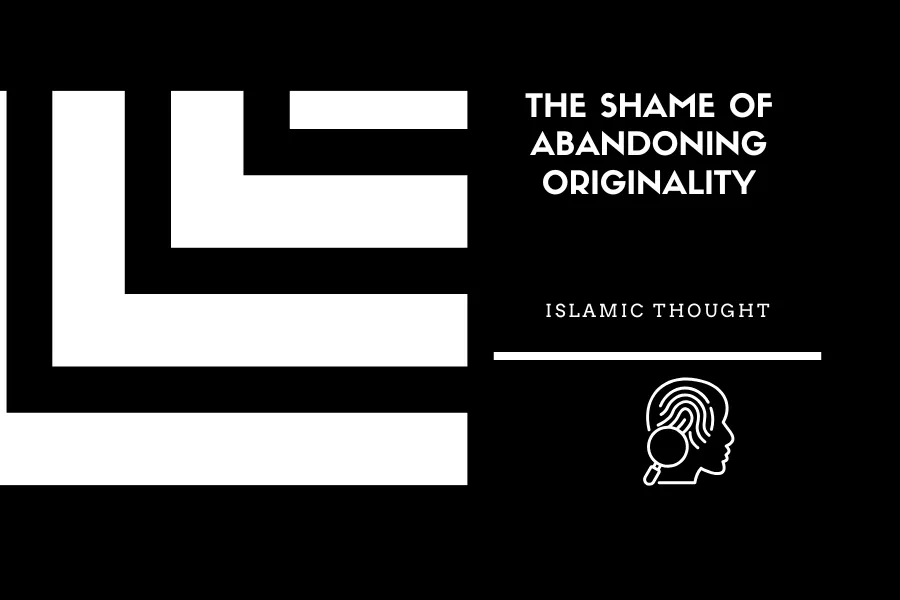
The Shame of Abandoning Originality
The Shame of Abandoning Originality
Originality is the engine of progress. It sparks thought, builds civilizations, and fuels every breakthrough. From the earliest days of Islam to the golden age of Andalus, originality—rooted in revelation—was the power that shaped Muslim societies. The Companions of the Prophet ﷺ brought their own strengths, enriching the ummah without erasing their voices or conforming to a single mold.
Islamic history shows how originality thrived. Scholarship spread because each region adapted and built with its own flavor. The jurists of Medina weren’t identical to those in Iraq. The scholars of Andalus didn’t copy Khorasan. Creativity was honored, not silenced. Diversity made the ummah stronger and more resilient.
Originality isn’t just creativity—it’s built into creation itself. Every sound, every shade, every culture reflects Allah’s unique design. Diversity in tone, color, and rhythm is a sign of His mercy. To suppress originality is to ignore that divine gift.
Yet today, under the name of “tarbiyyah” or cultivation, many confuse conformity with piety and dependence with safety. We blur the line between Sunnah and imitation—dishonoring both ourselves and those before us.
Instead of strengthening Islam through originality, many chase foreign ideals and borrowed systems. The weakest communities are those that gave up their strengths for someone else’s script. Globally, schools and validation systems shape people into replicas. For indigenous Muslims in America, the wound is deeper: originality is erased under the false label of religious duty. When losing your identity is called sacred, reclaiming thought feels almost impossible.
The Cost of Looking Fake
And the worst part? We don’t even realize how ridiculous we look. The fake accents, borrowed mannerisms—it’s clear to everyone but us. What we call authentic, others see as imitation.
Take Sister Sarah and Brother Kamal. Both raised in the inner city, full of brilliance—but once the new garb comes on, so does the imported accent.
Sister Sarah says "ya'ni" ("you know") fifty times in a three-minute conversation with someone who only speaks English—but can’t write the Arabic verb.
Brother Kamal? He throws on a gutra (traditional Arab head scarf) and he's going to "ayy naam" ("Oh, yes") you to death.
Their accent is as real as the canned hummus in Walmart!
Let me be clear: learning Arabic to understand the Quran is noble. But there's a difference between practicing sincerely and seeking validation. Speaking in your authentic voice—"ya heard 'me," "ya feel me"—keeps communication relatable and familiar.
Abandoning your speech for borrowed accents doesn’t make you more pious. It distances you from your people and alienates Islam from your community.
Language is for communication. Arabic is for understanding Allah’s words. Rich expression is a fingerprint—no two people speak the same. Why not embrace our voice and stand proud? An Arab Muslim may honor you as a guest, but he’ll frown at your poor imitation.
What Conformity Really Costs
This shallow imitation creates intellectual dullness, erodes self-worth, and deepens community division. A following people are not a developing people, which stands in opposition to Allah's desire for His servants to grow and contribute their unique gifts. A people that don't create can't control their future. A culture that mocks uniqueness stays chained. Colonialism didn't just steal land—it reshaped minds through schools, syllabi, and symbols. Religious colonialism doesn't need chains—it erases brilliance and swaps native strength for borrowed structure.
The Final Question
Why abandon originality? Who told you that blending in was safer than standing in your brilliance? When did imitation become easier than building with Allah’s gifts?
Our deen is built on sincere advice, so here it is: reclaim your originality. Root your creativity in revelation, embrace your God-given voice, and serve your people with authenticity.
—
Brutha Bilal
Build the Mind, Build the Community
9 July 2025 | 12 Muharram 1447 AH